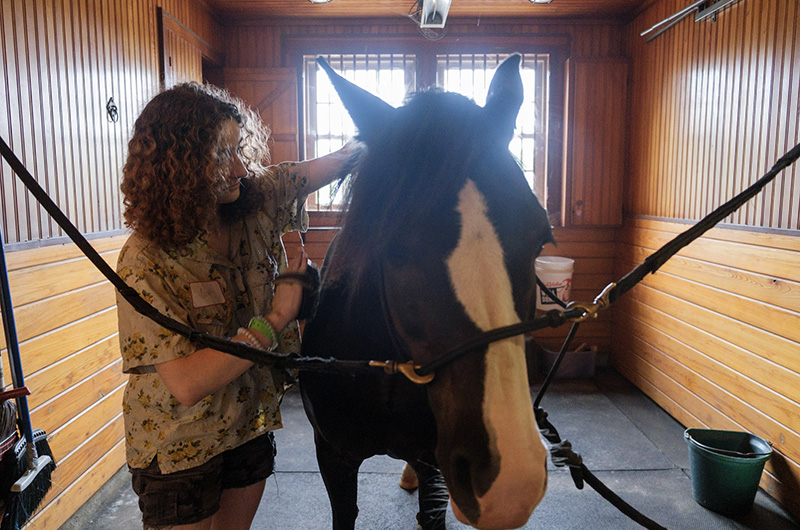Inclusivity and horseback riding haven’t always grazed in the same pasture. The instructors at Misty Meadows Equine Learning Center in West Tisbury want to change that.
On Monday, August 15, Misty Meadows hosts Geraldine Brooks and Henry Louis Gates Jr. to discuss Ms. Brooks’s recent novel, Horse, about the history of the racing horse Lexington and the Black jockey who rode him. The event will double as a fundraiser for the center’s educational and therapeutic programs.
“There’s a perception that horses are just for people who can afford them, but we try to make it accessible to everyone,” Misty Meadows executive director Sarah McKay said. “Our programs are priced accessibly. We want to show that you can have a meaningful experience or relationship with a horse without owning a horse.”
Ms. Brooks first became involved with the center through her own pony, Valentine, who had spent a few winters at Misty Meadows.
“I’ve known Geraldine a few years, and I’ve come to appreciate her kind and gentle nature and her brilliant mind,” Ms. McKay said. “When we first heard about the book, our board member Randi Baird connected with her and it evolved from there.”
Mr. Gates immediately came to mind, Ms. McKay said, as he had previously done a book signing with Ms. Brooks in Boston.
“[Ms. Brooks’s book] isn’t just a story about horses, it’s also a story about race,” McKay said. “It was a natural fit.”
Misty Meadows, located on the land formerly known as Nat’s Farm, has been a riding stable since 1972. In 2017, the center began offering therapeutic programs under new leadership, and became an accredited member of the Professional Association of Therapeutic Horsemanship International (PATH) in 2019.
The benefits of therapeutic horsemanship, Ms. McKay said, go beyond just mental. Approaching working with horses can provide physical, emotional, social and cognitive benefits to participants with special needs.
“There are proven benefits from the motion of riding a horse, from opening up the hips or pelvis or strengthening and opening the core to help breathing,” Ms. McKay said. “For people who don’t have the option to ride a horse, we also practice mindfulness and breathing exercises that can be incredibly powerful. It’s a way to connect with the horse but also connect with the self.”
Unlike other therapy animals such as dogs, horses are prey animals with a specific herd mentality. It takes much longer to build trust with them, and learning their behaviors is an ongoing project.
“More than many other places, we try to replicate as much as possible how horses live in nature,” Ms. McKay said. “We observe how they live, how they communicate, what their values are. It’s a really powerful teaching tool. I’ve been working with horses for decades and I’ve still learned new things in the past five years.”
For more information about Misty Meadows Equine Learning Center and the upcoming fundraiser, visit mistymeadowsmv.org.








Comments (1)
Comments
Comment policy »